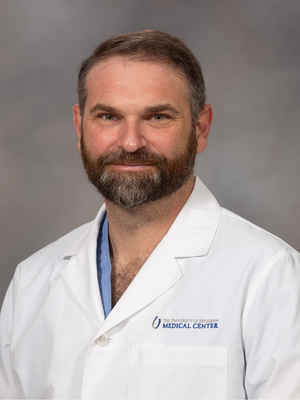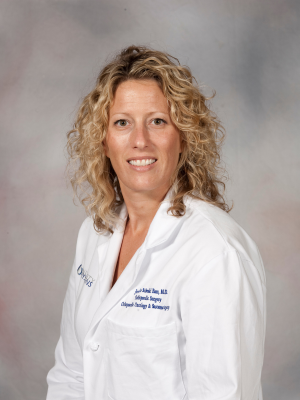- Cancer Institute
- News Stories
- 2022
- August
August
- Cancer Center and Research Institute
-
Cancer Research
- Cancer Research Overview
-
Cancer Registries
- Cancer Registries Home
- UMMC Cancer Registry
- Mississippi Cancer Registry
- Clinical Trials
- Programs
- For Students and Trainees
- Patient Support
- Give Now
- In the News
- Contact Cancer Center and Research Institute
- CCRI Leadership
Investigator Highlight: Dr. Jennifer Barr and Dr. Ben McIntyre


Dr. Jennifer Barr, an assistant professor of orthopedic surgery, and Dr. Ben McIntyre, professor of plastic surgery, work together on the CCRI Interdisciplinary Sarcoma Care team to help patients who have bone and connective tissue cancers. Barr and Dr. Anderson Collier, director of the pediatric hematology-oncology division, head the team that treats adult and pediatric patients. Barr and McIntyre communicate about surgeries before hand. Once Barr has pathology reports that show negative margins, McIntrye steps in to start the reconstruction. Together they seek to improve outcomes and function for cancer patients.
How long have you worked with your current organization and what type of research do you do?
Barr: I have been at UMMC since 2005. I did residency here from 2005-2010, completed a fellowship in Seattle and returned in 2011 as staff. Most of my research is clinical and focuses on the various sarcomas I’ve treated in practice.
McIntyre: I have been with UMMC since March of 2016 and have been specializing in cancer reconstruction since I started practice in 2011. Most of my research is clinical and focuses on the outcomes of reconstructive procedures.
Would you describe your most recent research and/or publications?
Barr: McIntyre and I have treated a series of periarticular soft tissue sarcomas. After I remove the cancer, it leaves a large soft tissue defect. Dr. McIntyre has been able to mobilize a propeller flap to cover these defects with great success. They hold up to neoadjuvant or adjuvant radiation without breakdown and the patient retains functional mobility around their knee.
McIntyre: My recent research highlights our use of local tissue flaps to reconstruct extensive soft tissue defects of the limbs following sarcoma tumor resection. These cases are complex and require a team approach. Historically, many of these larger extremity sarcomas have been treated by limb amputation but with combined multidisciplinary approaches there have been higher limb preservation rates. We have been publishing our work on these combined approaches to extremity sarcoma surgery.
How does your recent research and/or publications relate to your overall research within cancer?
Barr: Our publication has highlighted the manner in which complex sarcoma cases are treated at UMMC. Many sarcoma cases require multiple surgeons over many subspecialties to uniquely treat each case.
McIntyre: Our recent publication on limb reconstruction dovetails well with the rest of my work here at UMMC. We have been employing various novel methods of reconstruction using small blood vessels and the attached tissues to transport skin flaps over large wounds. We have used this in head and neck and breast cancer applications.
What inspired your most recent research and/or publications?
Barr: We wanted to share our treatment strategy at UMMC with other surgeons who may encounter periarticular tumors.
McIntyre: In many instances, when a plastic surgeon is involved in these complex cancer cases, the reconstruction component of the operation can take many hours in the operating room. With our use of these small vessel flaps or ‘propeller flaps’ we have developed a way to safely do the surgery in a shorter operative timeframe and with less morbidity to the patient. We have also been able to prevent postop ICU stays and shorten the overall hospital stay in these cases. We feel this is so beneficial to the patient and we have been very successful in our patient population.
What advice can you give medical students and/or high-school students who are interested in pursuing a career in research?
Barr: Get started early with a research project before your schooling becomes overwhelming. Being a self-starter and having the motivation to carry through a project is essential.
McIntyre: Research can be very rewarding and doesn’t always have be benchside in the laboratory. Most of my work involves direct patient care and hands on work in the operating room. I enjoy the innovation of my field and the ability I have to collaborate with so many different specialists. This is a team-based approach to research and patient outcomes. This work is impactful for patients and can be seen immediately. I find it exciting to present our work and it usually affords me the opportunity to visit many other centers each year to discuss our work. I encourage medical students to find a mentor in an area who they find inspiring and start to collaborate early with that mentor so they can develop their skills in data collection, writing and research. This will position them well for advancement and will accelerate their ability to successfully complete projects.


